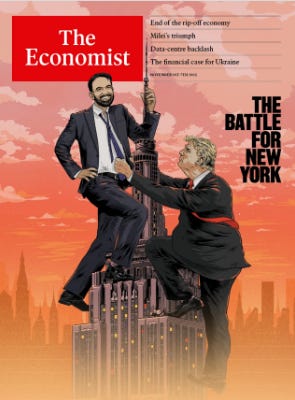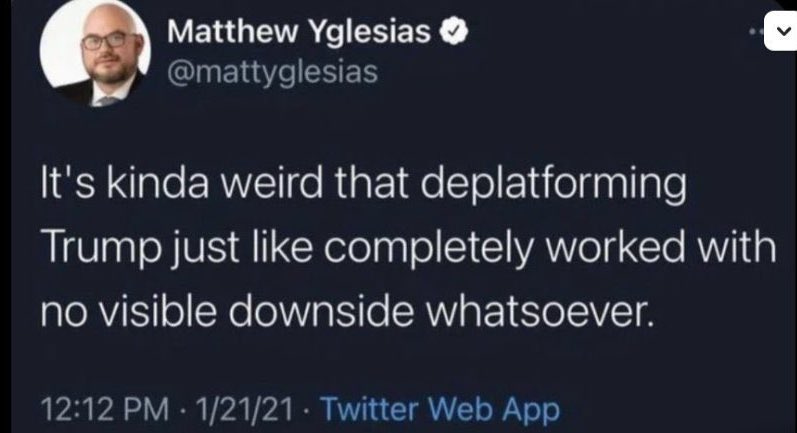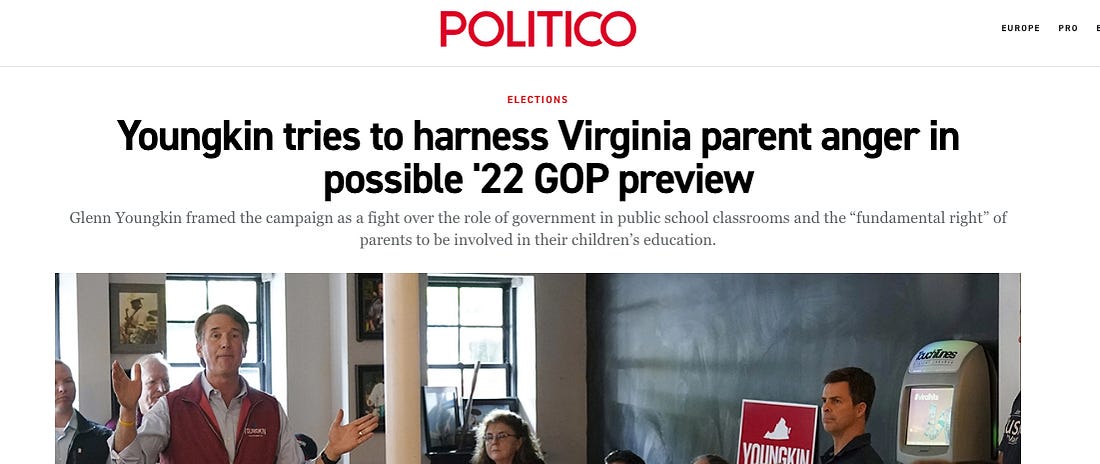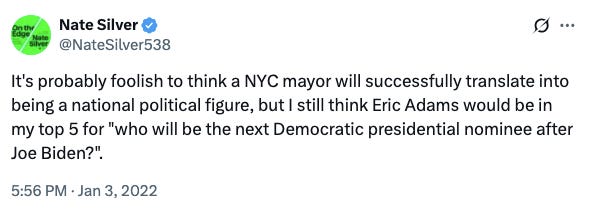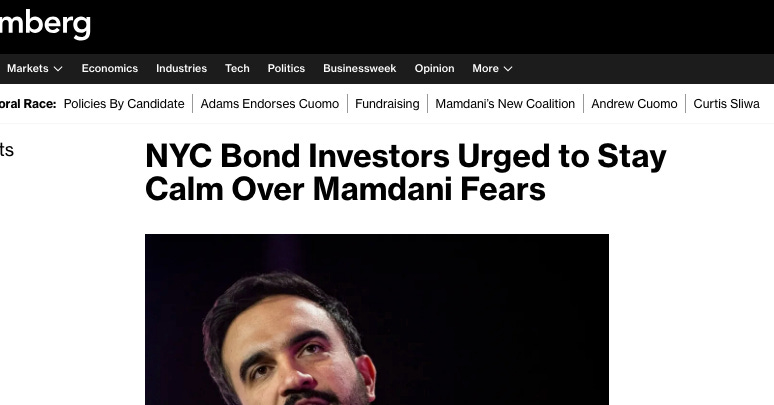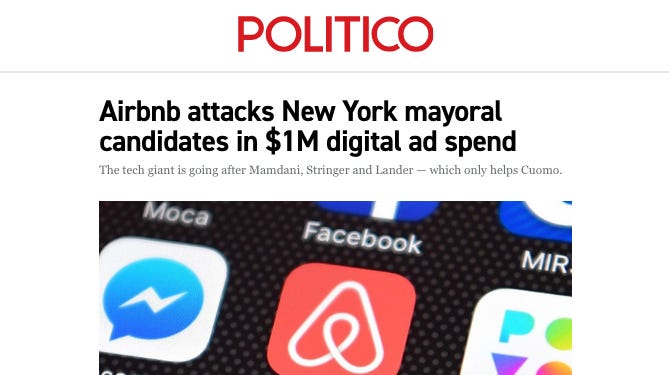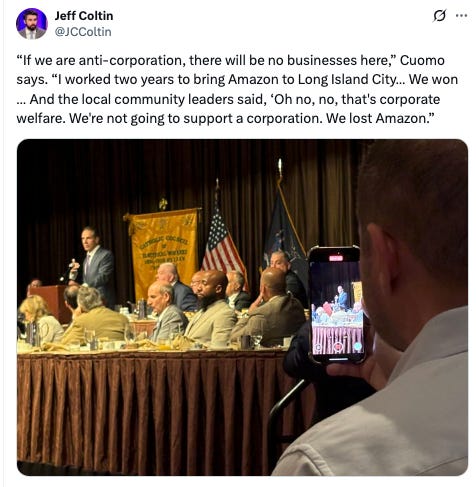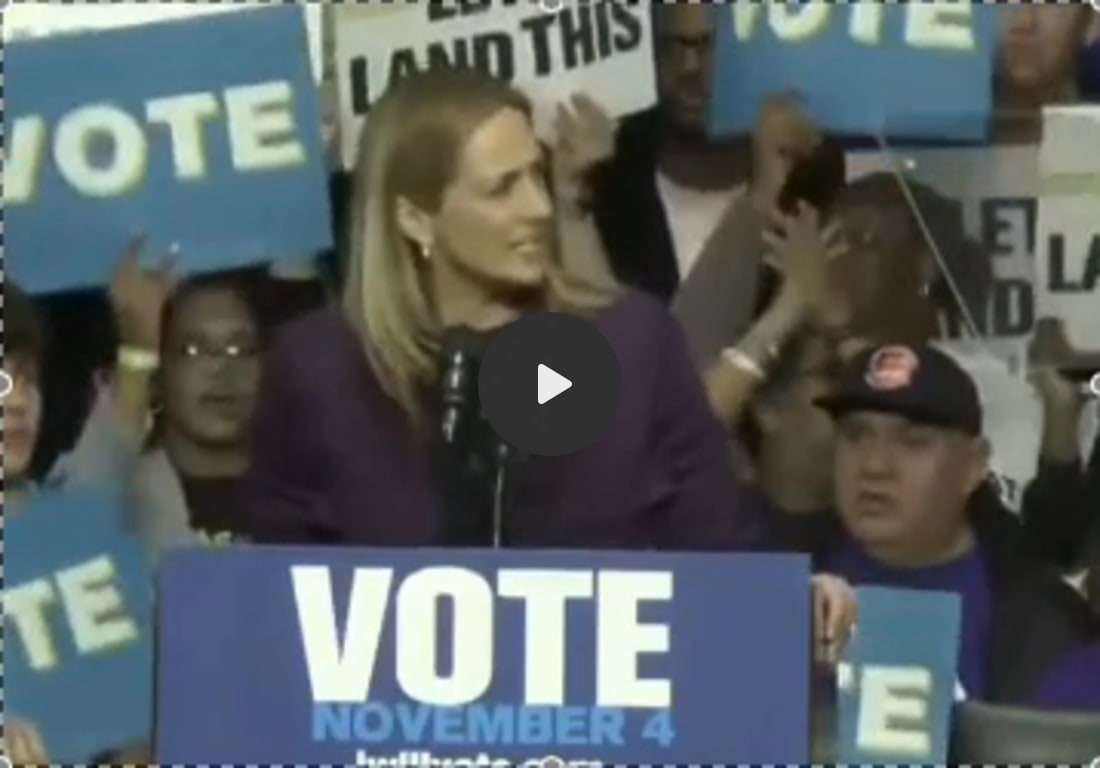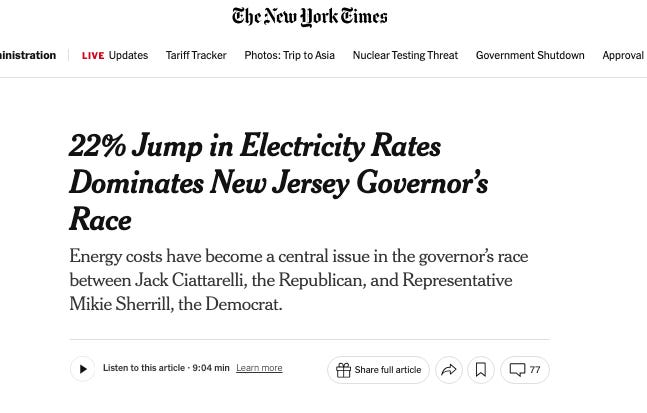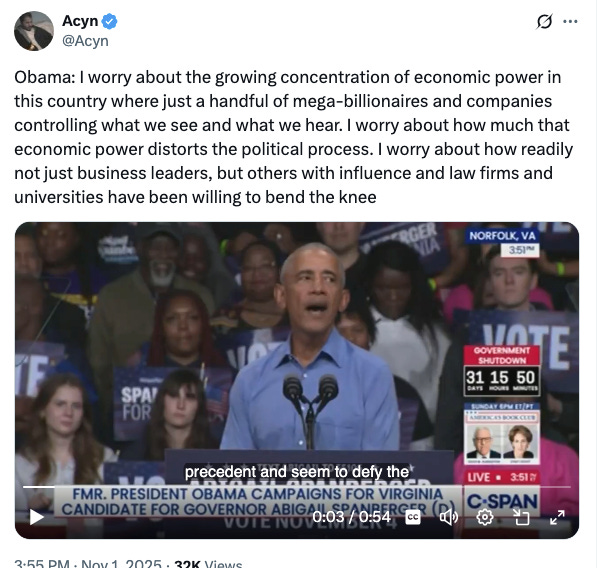Monopoly Round-Up: Voters May Be About to Terrify Corporate AmericaThis week, voters will choose between Zohran Mamdani and Andrew Cuomo, and pick new leaders in Virginia and New Jersey. Plus, are big tech data centers all America does?Lots of news, as usual. The Supreme Court will hear arguments on Trump’s tariffs, there’s a major de-escalation between the U.S. and China, and big tech continues to ramp up data centers investment, which is apparently all America does these days. But I want to focus on something that will set the template for the next three years of politics. This Tuesday, there are going to be a few elections in America, contests that will give us the first real indications of how voters think things have gone since they rejected Joe Biden and the Democrats in 2024. And it looks like the key issue is going to be how corporate power has made life in America unaffordable, with electric utility rates forcing all candidates to talk to that problem. These elections are happening in just a few places. New Jersey and Virginia, as well as the city of New York, have contests during the first year of the Presidential term. But even though they happen in just a few places, they are only thing we have besides unreliable polls to understand what the public wants. So these elections indicate, broadly to power centers, from corporate leaders to politicians to foundations, what some significant chunk of the public thinks. Here, for instance, is The Economist’s cover for this coming week, focusing on New York City mayoral candidate Zohran Mamdani’s election on Tuesday. It says something about the importance of these elections that The Economist chose to emphasize a local municipal decision for its cover. Setting the StageBefore discussing specifics, it’s important to go over how the last set of these elections set the stage for the current moment, because that will help us understand why they matter so much. After Biden’s win in 2020, and Trump’s behavior on January 6th, the GOP internally was both shattered and ashamed, believing the Trump experiment had ended in disaster. Worldwide, elites felt a sense of relief. Over the course of the next year, Democrats felt they were in a strong position. They governed by spending large sums of money in the Covid era, while investigating the right. The corporate world tried to go progressive; big tech firms de-platformed Trump and conservatives over everything from the election to content around Covid. The concept of eliminating “misinformation” was important to the citadels of the establishment, as were masking, protests, and social controls. Here’s a real tweet from Matt Yglesias making the point. But in November of 2021, there was a political upset in the blue state of Virginia. Financier and Republican candidate Glenn Youngkin beat a veteran Democrat, Terry McAuliffe, for the gubernatorial slot. At the same time, New Jersey Democratic Governor Phil Murphy nearly lost a race that was much closer than expected, in an even bluer state. These two contests were the first warning signs for the Joe Biden-led Democrats. Youngkin focused on how the Democrats kept the schools closed, as well as transgender issues and race. Within the Democratic Party, progressives were on the run. In New York City, former police officer and politician Eric Adams won the office of mayor, backed by Wall Street and real estate interests, as well as black voters. Here’s an infamous tweet at the time from electoral analyst Nate Silver, underscoring the point. Corporate power was nowhere to be found at a political question, even as the net worth of the top 0.1% doubled from 2020-2025. It wasn’t that it didn’t matter, as we noted in BIG, the multi-trillion Wall Street-friendly Covid bailout that started under Trump, but continued into the Biden era, super-charged an oligarchy. But since neither party discussed this multi-trillion dollar transfer of wealth, the public latched on to a more inchoate rage, which was anger at restrictions on working people through school closures and mask mandates, and woke progressive elitist scolds. When Youngkin won, Republicans and Trump regained confidence, recognizing that January 6th was not necessarily a political liability, and that Democrats were disliked. They began adopting the priority of “free speech” as a political argument, abandoning libertarianism and attacking big corporations as progressive and dangerous. On the other side, Democratic power centers recognized for the first time that priorities such “Defund the Police,” masking, and other socially controversial questions were unpopular. And the corporate world, at first cooperative with Biden, turned sour and hostile, as they sensed weakness. Four years ago, in other words, these elections laid out what the themes of the next few years ended up being. Donald Trump Walks Tall… But for How Long?And what about today? Well, this time, Trump is THE major global figure worldwide, and the Democratic Party and the liberal establishment is enfeebled, perhaps far more than they have ever been in my lifetime. Universities are collapsing internally, Hollywood is terrified, the corporate liberal media is consolidating into the hands of oligarchs, and Silicon Valley has turned to the right. And the Democratic leadership are widely disliked by their own voters for the first time in the last twenty years. Moreover, weakness among Democrats isn’t necessarily a bad thing, since it allows the party out of power to debate, bitterly, a new agenda. Don’t Mess with the ZohranAnd that sets us up for the most important election on Tuesday, by far, in New York City, where left-wing Democrat Zohran Mamdani faces two candidates, Andrew Cuomo and Curtis Sliwa, for mayor. This race is a straight-forward class-based fight among urban voters, with Mamdani stressing corporate power and affordability, freezing rents, taxing the rich, and the virtues of labor and small business. He’s campaigned with Lina Khan, Elizabeth Warren and Bernie Sanders, and discussed dealing with the massive electric utility rates of ConEdison. None of the major corporate-funded Democratic party leaders, from Barack Obama to Hillary Clinton to Chuck Schumer have endorsed Mamdani, so it’s very much about an old guard refusing to give way. Turnout may break records, and many people in the financial world are nervous. The Wall Street Journal editorialized in its typically understated manner that if Mamdani wins, “the entire free world may totter on its foundations.” To give you a sense of how important corporate power was in this race, here’s a headline from earlier this year, in the primary. On the other side, Cuomo is attempting to use culture war issues to discredit Mamdani, and oligarchs poured money into the race, aided by the real estate lobby, the New York Times, older voters, and the super-wealthy. Cuomo doesn’t have a great agenda, but his view on corporate power is fairly clear. Here’s a statement he made in the primary. Moderately PopulistWhile New York City is sucking up headlines, the races in New Jersey and Virginia have some Mamdani-style politics. In both states, two moderate Democratic “national security Moms,” both sitting members of Congress with the full support of the party establishment, are running. A few years ago, both would have tried to play up questions like abortion, but this time, they have to discuss corporate power. Here’s moderate New Jersey Democrat Mikie Sherrill, at one of her closing rallies, attacking utilities: “On day one, I’m declaring a state of emergency on utility hikes. I’ll freeze those rate hikes to lower your family’s bills. New Jersey, I am not playing. I am not writing a strongly worded letter, I am not starting up a working group, I’m not doing a 10 year study. I am declaring a state of emergency.” She name-checked and demanded more transparency from “our utility companies including PSE&G, JCP&L, Atlantic City Electric, and Rockland Electric, and our grid operator PJM.” Why is Sherrill going so hard at electric rates? Here’s why. An environment of anger at corporate America isn’t great for these kinds of candidates; Sherrill has faced attacks for getting rich through insider trading while in office, which isn’t true, though the less bad truth is that her husband runs “equity derivative sales at a New York investment bank.” That’s precisely the kind of person who has done well under the Trump-Biden bailout framework. Her opponent, Republican Jack Ciatarrelli, is running on a platform of cutting taxes, but corporate power isn’t absent from his platform either. He pledged to take on health care bloat by offering to “crack down on insurers to lower costs, as well as prevent the improper withholding of claims and the misuse of the preauthorization process designed to inflate profits and unfairly deny coverage to people who have paid for it.” As the New York Times put it, “what happens in New Jersey is likely to be an early read of the national political mood in 2026, when a majority of governors’ mansions will be up for grabs as well as congressional and state legislative seats. That’s because electricity rates are rising sharply in many states — the national average residential rate was up 5 percent in July from the same month last year, and energy experts say rates are likely to keep climbing quickly for the foreseeable future.” In Virginia, where the race isn’t particularly close because the Republican candidate isn’t credible, former CIA official and Congresswoman Abigail Spanberger nonetheless has an “affordability agenda” that includes cracking down on health care middlemen and forcing hospital pricing transparency. She’s also being forced to discuss the problem of data centers and electricity rates. A few days ago, Barack Obama stumped for Spanberger. And his messaging was laced with commentary about corporate power. So what does any of this mean? Corporate Titans Should Be AfraidIt’s possible that the Republicans do very well, and Trump consolidates his hold on power with a mandate from voters. But that seems unlikely. The polls aren’t good for the right, and Trump seems to agree, since he’s staying away from the races. So assuming that Tuesday sees some wins for populism, the consequences will be significant. The modern anti-monopoly movement is about 10 years old. And since we made the case to eliminate corporate power in America, the strategy has been to make arguments among elites and in media outlets, using pre-existing legal tools like antitrust and consumer protection law. But all major policy choices, from Federal Reserve bailouts to the Biden stimulus to the CHIPS Act to the Big Beautiful Bill have been structured without the anti-monopoly lens. Oligarchy got worse, even as our arguments gained credence. And there’s a simple reason for that: corporate power just wasn’t an issue in elections, and thus it was not something members of Congress cared about. The populists got a few small regulatory agencies under Joe Biden, but were sitting at the kids table. The big money and guns positions - the Fed, Treasury, Defense, Commerce - that stuff went to the trusted old guard. If that dynamic changes, and these elections suggests that’s starting to happen, then all bets are off. As the focus of politicians becomes addressing affordability by going at corporate power, then they will start to notice that the big money institutions and legislative frameworks are favorable to finance and monopoly. And it won’t just be a matter of creatively using stuff that already exists, but actually structuring law and policy directly with raw political power. That’s something we haven’t really seen in a meaningful way for populists in our lifetimes. There are a lot of caveats here, but that’s the gist of what I’m seeing. And now, the rest of the round-up. Lots of important stuff, such as big bank and water utility mergers, the Paramount-Warner soap opera continuing, and a big China deal that openly showed the world that America is no longer dominant. Also, with the government shut down, we are forced to rely on Chipotle’s CEO for his views on the state of the consumer. That and more after the paywall…... Continue reading this post for free in the Substack app |

